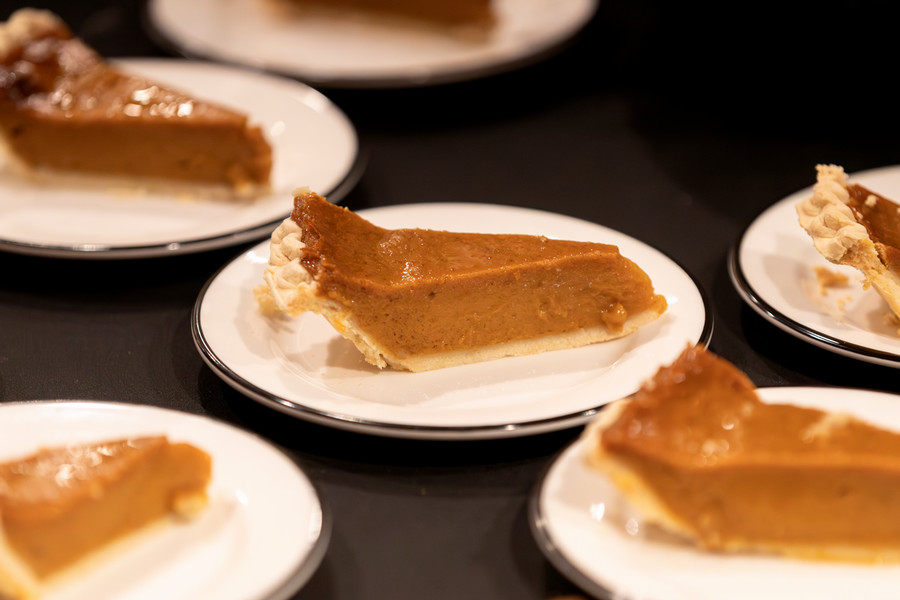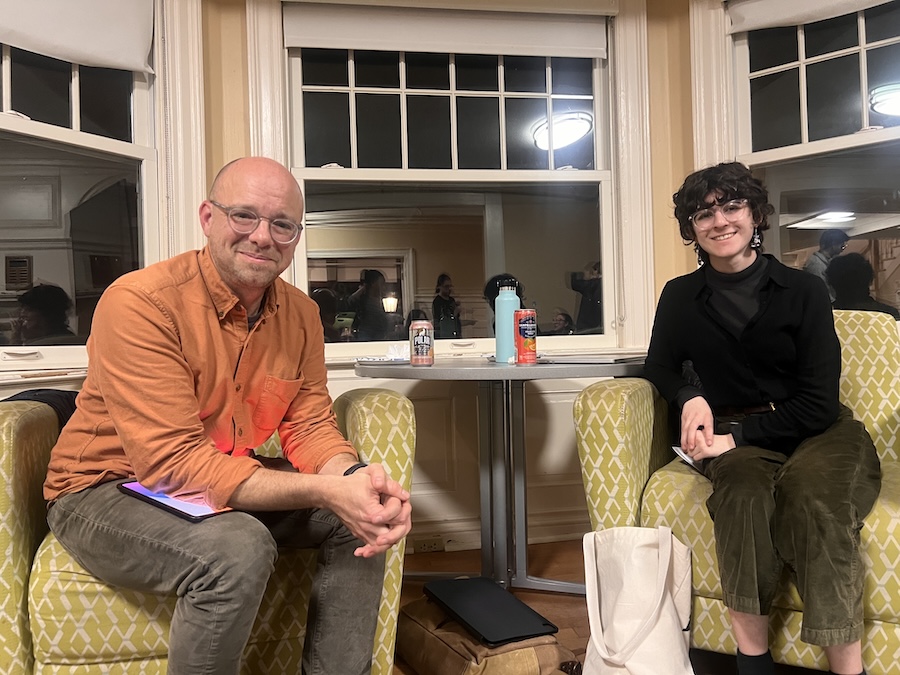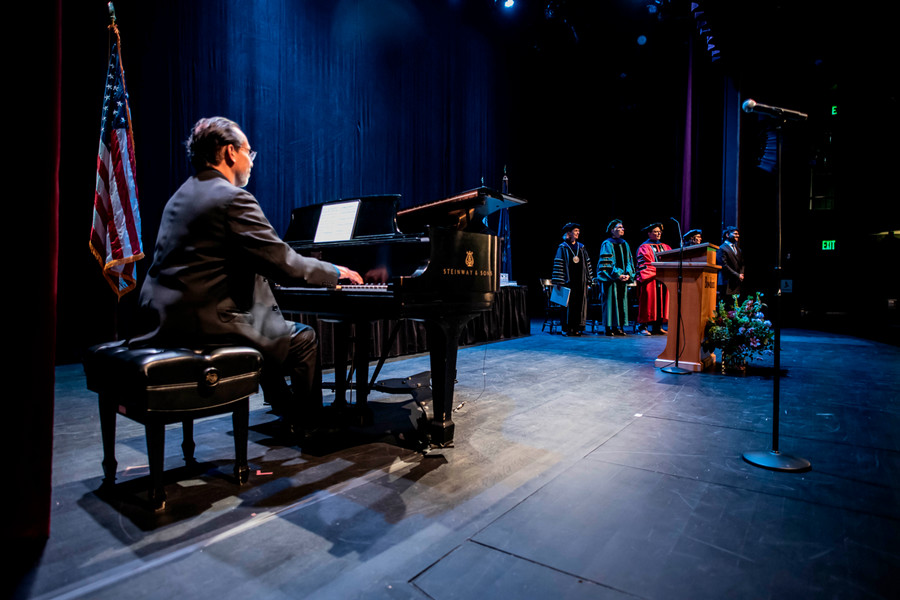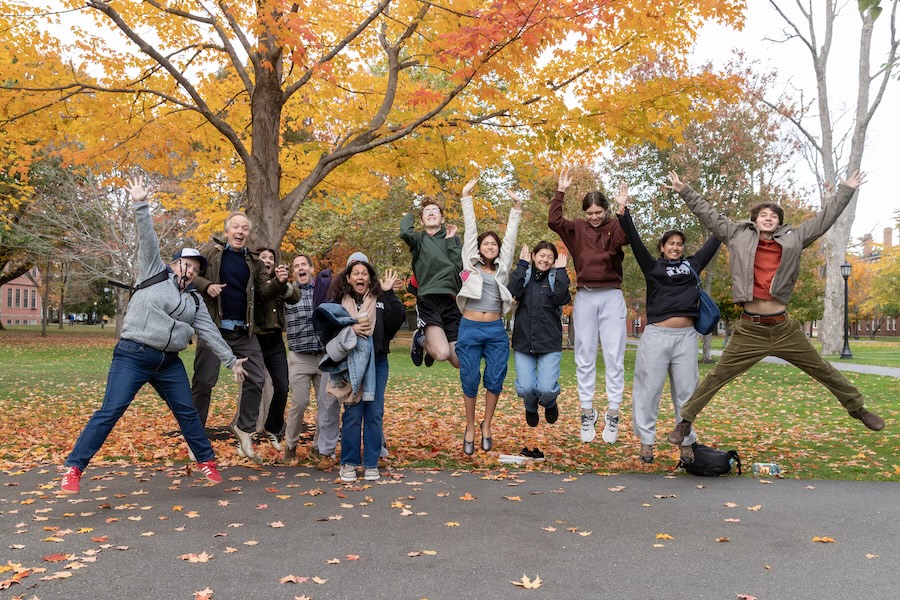Baccalaureate Remarks by Diana Furukawa ’18
By Rebecca GoldfineAs I was writing this, I struggled to find anything to say about the Bowdoin community that does not slip into a cliché. So then I figured I’d just start with one: we’ve all asked questions here–made inquiries. No matter who we are or what we study, we’ve transformed moments of curiosity into junctures of growth. But all too often this very curiosity, and the vulnerability it requires, are squashed by our pride and relegated to a whisper or a Google search. So today I want to talk about pride and its counterpart, humility, through a few iterations of a question which has steered my formal and informal education these past four years: why am I here?
Before I could put it to words, that question welled up inside of me in the form of homesickness. What was I doing moving more than 3,000 miles away from any place that I knew? Four years ago, alone on the plane from Seattle to Portland on the first of many zigzagged journeys to come, the woman seated next to me could see the question that I wore on my sleeve. She reassured me that Washington and Maine couldn’t be all that different, and I’ll always remember the line she said next: “it’s all greens and blues, anyway. Just different shades.” As I peeked out my window at the hazy waters of Casco Bay for the first time, her words crystallized into a prayer.
And sure enough, tuning out the murmur of the same Maine waters a couple days later, I made my first friend here in the delirious immersion of late-night conversation. Yet as the jitters of my arrival softened in the months to come, the pride I had once felt about being a Bowdoin student began to erode. My question shifted from, “why am I here?” to “why are we here?” Why do we have access to elite higher education, over anyone else?
In my sociology classes, I learned about a process both obvious yet carefully shrouded: social reproduction, the transmission of wealth that often occurs, uninterrupted, from generation to generation. Yes, I was at Bowdoin because I had worked hard, but more importantly because I have the privileges of being mostly white and having highly educated parents. I don’t mean to say this has been the case for everyone in our class– it hasn’t. It’s been a lot easier for some of us to thrive here than others, often along lines of privilege of all kinds.
However, as much as Bowdoin is a site of opportunity, it is a site that reproduces inequality. And further, it has been and is a site of violence. The school stands on stolen Abenaki land in a place that was once known as Pejepscot, and yet here at Bowdoin, we seldom discuss Maine’s indigenous people, particularly when it threatens our romanticized self-conception. We are righteously stringent about academic plagiarism, and yet we aren’t when it comes to perpetrators of sexual violence, some of whom sit among us today. We purport the value of the common good, and yet we don’t pay our housekeepers a living wage.
As a brief aside, if you want to change that…one thing you can do today is learn more about the petition that is currently circulating calling for a living wage for our housekeeping and grounds-keeping staff. Ask anyone with a yellow ribbon on to tell you more about it; while it may look like a symbolic gesture right now, with enough signatures, it can be more than that.
I say this to underscore that Bowdoin is a place of contradiction, but not to condemn Bowdoin. I say them because loving a place entails critically examining its multiple truths–as my friend Sydney would say, love deconstructs, to reconstruct. And I use the word privilege not to invalidate anyone’s work ethic, but to remind myself that I did not form solely based on my own merit. I did not form in isolation, and no one does. Behind every person here today are structural circumstances that helped them along the way and people who supported them into being who they are.
Tomorrow, we will carry–in a little scroll of paper–a form of knowledge that is legitimated by our society. But what makes us think that certain kinds of knowledge are more valuable than others? What makes us think that knowing how to write an academic paper is more valuable than knowing how to care for a family, fix a car, or be a good listener? Why does our pursuit of “knowledge” so often compromise being present in the vulnerable beauty that lies within doubt? These have become my questions.
Cultural humility is the closest thing to an answer that I’ve encountered because, by definition, it’s not an answer. It’s not a checklist, or a scroll of paper, not a static way of being, but a way of growing. Melanie Tervalon and Jann Murray-Garcia coined the term “cultural humility” in 1989 as a rejection of the arrival point implied by “cultural competence.” It’s a framework for engaging with others that strives for the acknowledgement and mitigation of power imbalances through lifelong learning and critical self-reflection.
At the core, cultural humility suggests that knowledge is about accepting how much we don’t know, locating the blind spots and implicit biases that we all have. It’s about consistently asking, “what am I not seeing?”, a question that those of us with privilege must ask ourselves more frequently than others. And self-reflection must be a part of that because our stories, experiences, and struggles are intrinsically connected. To answer my initial question, I am here because others are not.
It was in the cramped office of my two-time boss (and two-time friend), Matt–to me, the walking embodiment of cultural humility–that I first learned of the term. But months before then, I had felt its meaning. My junior year, during a challenging time, I had started attending a local Quaker meeting, which basically entails sitting in a circle, for an hour, in silence, unless you are “moved by the spirit” to speak. The first few times, I found it very hard to focus. I watched the light patterns on the windows and the occasional ants crawling across the floor, and I projected little narratives onto them as they stumbled on the wood paneling–ants have never been more fascinating to me than in Quaker meeting.
Most of the time, no one speaks at all. So when I hear someone’s breath hasten, though they’re usually just clearing their throat, I get excited. I imagine that the words they say next could be precisely the thing that I’m not yet able to see. Cultural humility has pushed me to wonder what would happen if I engaged with each new person in this way, outside of the context of Quaker meeting.
It has pushed me to believe that in everyone there is both a form of knowledge I know nothing of and something familiar: both a mirror and a window, as my photography professor would say. To trust that everyone has unique languages through which they interpret the world, and everyone has the some of the questions we need most. When knowledge truly means questioning, we have a better chance of seeing and defending this complex dignity in each person.
Today is a day of pride, no doubt. We’ve worked hard–I’ve seen you in the library at one o’clock in the morning when the little bells go off to usher us home (and I’ve seen you in the Edwards every hour of the day or night). Yet this pride is hollow unless we practice humility,holding an awareness for the circumstances that got us here and gratitude for those who have forged us. On that note, I want to express my gratitude that on a personal level, the question of why I am here has almost completely dissolved. Because of you all, I often wonder who I would be without my time here. Thank you, and congratulations!



